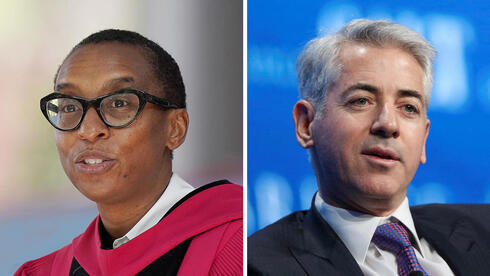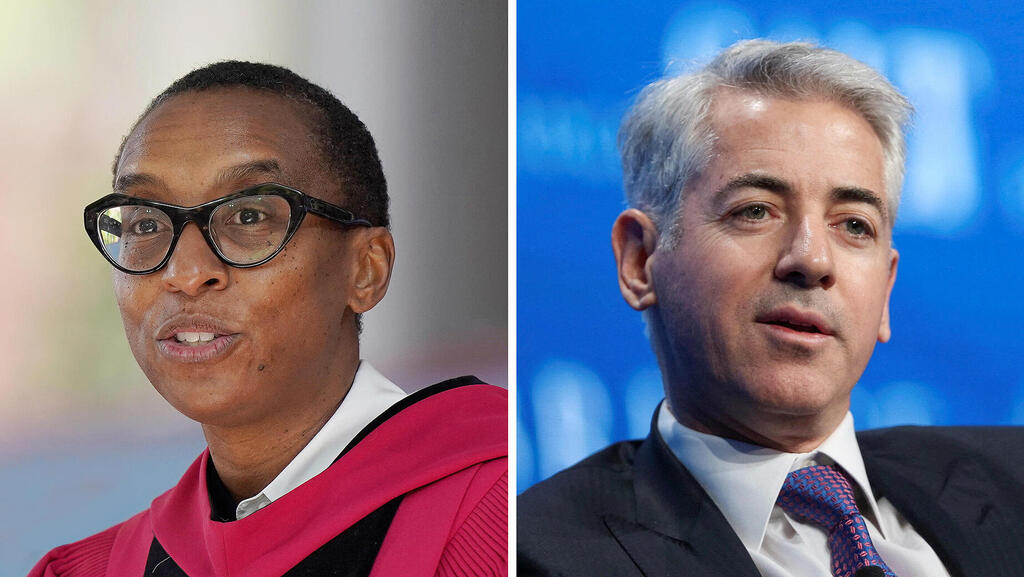
ISRAEL AT WAR
Did billionaire Bill Ackman’s actions backfire in the war against Harvard anti-Semitism?
The head of the Pershing Square hedge fund is the most prominent voice in condemning the powerlessness of the elite institutions in the face of anti-Semitism. However, the billionaire investor found that the pressures that work against Wall Street corporations are ineffective against the old money of universities
Since the war in Gaza broke out and sparked a wave of anti-Semitism, one American billionaire has stood out above all others in his outspokeness: Bill Ackman. In recent weeks, the Jewish hedge fund manager has established himself as the standard bearer for Jewish students, while making a significant contribution to the centrality of the debate on anti-Semitism at elite American universities. At the same time, his aggressive activity on the subject is also a lesson and testament regarding the limitations of power at the meeting between the two worlds - how an activist investor from Wall Street suffers defeat in the battle against the fortified wall of old money.
On October 9, when the dimensions of the destruction and violence as a result of the Hamas attack began to become clear, over 30 student organizations at Harvard, Ackman's alma mater and the institution to which he donated tens of millions of dollars, issued a statement that they consider Israel "fully responsible" for the mass slaughter. The university leaders kept quiet, and Ackman defiantly posted on X that the names of the signatories should be published, so that their opinions are known to the public and so that his hedge fund, Pershing Square, and other employers would know that these are students that should not be hired in the future.
1 View gallery


Harvard President Caludine Gay (left) & Bill Ackman
(Photo: Reuters/Richard Brian, AP/Steven Senne)
His call was successful, and many organizations withdrew from the letter, and in general, active students began to demonstrate with their faces covered, in an effort to separate their political views from their professional future. But that was only the beginning. From that moment he began to push the university administration and Harvard's president in particular, Claudine Gay, to curb the pro-Palestinian activity on the campuses on the grounds that it encourages violence and is steeped in anti-Semitism. He went on to criticize the conduct of the board, the university's diversity, equity and inclusion (DEI) programs, constantly posting on X, calling and writing long open letters. Also, Ackman recruited donors like him to also exert pressure on the issue, some of them from other universities where there is widespread political activity.
All of these were moves taken straight from his experiences throughout his years as an activist hedge fund manager against large corporations whose business activities he sought to influence. But his success in one area did not translate to the other. Harvard showed resistance to Ackman, much to his dismay, which he also expressed publicly.
"It would have been wise of her to listen or at least pick up the phone," Ackman said in an interview in which he resented that Gay and other Harvard administrators did not respond to his claims and advice. In his first open letter to Gay in early November, he complained that she refused to meet with him. His public frustration seems like a state of cognitive dissonance: The hedge fund founder who built much of his reputation on using aggressive public announcements to boost the value of his investments simply couldn't influence that institution in the ways that made him famous. The investor who donated several tens of millions of dollars to Harvard, failed to translate this investment into an impact.
He offered his private jet
For example, Gay was invited to a screening of the video of the horrors, a private screening in the presence of Israel's ambassador to the United Nations, Gilad Erdan. The screening took place on the eve of a congressional hearing on anti-Semitism on campuses, in which Gay testified. Due to her tight schedule, she had to miss the event. Ackman publicly proposed to offer her use of his private jet so that she would make it to the screening and the hearing the next day, and even offered to accompany her personally and dine with her on the plane. When she refused, he turned that into an event as well.
At the congressional hearing, Gay and two presidents from other universities were unable to unequivocally answer the question of whether calling for the genocide of Jews is a violation of the institutions' code of conduct. Gay replied: "Maybe, depending on the context." She quickly apologized for this lack of moral clarity, but publicly it didn't change much. Ackman himself launched a focused campaign to get her fired, the first black female president in the university's history, who took office only last July. As part of the campaign, he published many posts on X to his million followers, accusing her of being hired because of her skin color and gender, posting betting odds for her dismissal on a website that allows users to bet on the results of various events, and shared a new claim that she is guilty of plagiarizing four articles, including her doctoral thesis. "All of them must resign in disgrace," Ackman wrote, "she must go now."
The pressure was focused, but mostly normative. Many donors, including Ackman, did not threaten at this stage to stop donating to Harvard. At the prestigious University of Pennsylvania (Penn), similar pressure was exerted to fire President Liz Magill, who behaved similarly to Gay in the hearing - although there the donors promised to withdraw their money. Whether these threats made the difference, or perhaps a difference in the corporate culture, cannot be determined. Bottom line, in the weeks that have passed, several Harvard donors have stopped giving what Ackman claims amounted to $1 billion. Ackman himself has previously threatened to stop donations for various reasons, including when Harvard did not listen to his investment advice.
The elite universities are lined with old money. A contribution from wealthy graduates is needed, and although it almost always comes with different conditions or for a specific purpose, it does not have a direct effect on the management of the institutions.
Part of the evolution of over 100 years of accumulating huge capital in endowment funds established Harvard, the richest academic institution in the United States with assets of $51 billion, as the epitome of old money. Being such, money is not talked about and not used to demonstrate power. And what happens when old money meets an activist investor like Ackman, whose entire professional existence is based on leveraging money as a tool of incessant pressure and with the goal of bringing about dramatic changes quickly? Turns out not much. His campaign to oust Gay failed, with the Harvard administration announcing last week that it was standing behind her. At the same time, the management rejected the accusations of plagiarism. Ackman discovered that an old institution like Harvard cannot be pressured as if it were a public company, since its value is not measured by the price of a share. The board of directors has no obligation to maximize economic value for the investors, with its purpose being to protect the valuable reputation of the institution. Ackman even realized that money does not always buy influence or a seat at the table with the decision-makers, and that Harvard's reputation would lose much more if it succumbed to the pressure that one man was trying to exert. "I have been told now by two reporters that one of the factors that made it challenging for the Harvard board to fire Gay was that they were concerned it would look like they were kowtowing to me," Ackman wrote on X, formerly Twitter, upon learning that Gay would not be fired. "In other words, the reporters explained, quoting the trustees: 'Had Bill just stopped tweeting, we would have come to the right answer.' So much for Veritas."













